(PORT VILA, VANUATU) – Examining the effectiveness of regional security cooperation and the broader regional security architectures that exist in the Pacific Islands region was the focus of a recent workshop held in Port Vila, Vanuatu. The Asia-Pacific Center for Security Studies (APCSS) and the Pacific Institute of Public Policy (PiPP) hosted the workshop titled “Regional Security Governance and Architecture in the Pacific Islands Region: Priorities for a Resilient Future” August 4-8, 2014.
Vanuatu’s Prime Minister Joe Natuman and, via video, U.S. Ambassador to Papua New Guinea, Solomon Islands and Vanuatu Walter North opened the event that included 48 security practitioners and subject matter experts from 21 nations and territories and six regional international organizations.
Attending were three pivotal regional organizations: the Pacific Islands Forum, Secretariat of the Pacific Community, and the Melanesian Spearhead Group. Also attending were representatives from the United Nations Development Programme Regional Pacific Center, the Pacific Institute for Public Policy, and FemLINKPACIFIC, an important regional non-governmental organizations addressing work related to United Nations Security Council Resolution 1325 on Women, Peace and Security.
Security practitioners and experts came from Australia, China, the Federated States of Micronesia, Fiji, France, Guam, Indonesia, Japan, Kiribati, Nauru, New Zealand, Niue, Papua New Guinea, the Republic of the Marshall Islands, Samoa, Solomon Islands, Taiwan, Tonga, Tuvalu, the United States, and Vanuatu.
Facilitated discussions gave participants an opportunity to share their understanding of the issues and recommend specific measures that may be taken to enhance security and governance in the region. The workshop concluded with briefings by participants of their shared findings and recommended next steps for enhancing the regional cooperation to senior officials including a representative of the Pacific Islands Forum.
Dr. Rouben Azizian, APCSS academic lead, stated that “the workshop resulted in participants building a shared appreciation of key regional security challenges and priorities and building multinational and whole-of-government professional contacts for future collaboration.” Dean Carleton Cramer, APCSS, noted that “the workshop coincided with Secretary of State John Kerry’s recent trip to the region, and recent speech in Honolulu, Hawaii promoting regional cooperation.”
Derek Brien, Executive Director of PiPP, said “the workshop was a good opportunity to assess the regional security architecture and highlight the growing linkages between development and security and ways nations can also strengthen their internal peace-building processes.”
According to Permanent Secretary, Mr. Beraki Jino, of Solomon Islands Ministry of Foreign Affairs, “I think the workshop was, and particularly for the Solomon Islands, very, very useful …It was relevant to the work of the Ministry of Foreign Affairs and our national security environment. Solomon Islands is working on a new security policy and this workshop will help a lot in our understanding some of the security issues that need to be addressed, not only for Solomon Islands, but in relation to the region.”
As a result of this workshop, APCSS will produce a publication on these workshop proceedings. This publication is schedule to be released in the future. Please check the apcss.org workshop for the publication when it is released.
-END-
The Asia-Pacific Center for Security Center‘s mission is to build capacities and communities of interest by educating, connecting and empowering security practitioners to advance Asia-Pacific security. APCSS is a U.S. Department of Defense institute that officially opened Sept. 4, 1995, in Honolulu, Hawaii. It provides a forum where current and future military and civilian leaders from Asia-Pacific nations gather to enhance Asia-Pacific security cooperation through programs of executive education.
The Pacific Institute of Public Policy (PiPP) is the leading independent think tank serving the Pacific islands community by stimulating and supporting informed policy debate in the Pacific. PiPP engages and connects principal stakeholders, promoting fraternity between the Pacific island countries and regional neighbours such as New Zealand and Australia.
Central to PIPP’s model of engagement with policy stakeholders is research communications. PIPP synthesises research findings to draw out practical applications that can advance national development programs. Information is shared using innovative, people-centred communication processes. Written material is published in user relevant formats and languages, and complemented using other media including audio and video pod casts, discussion forums, social networking, press, radio and television.
- Mr. Peter Forau, Director General of the Melanesia Spearhead Group Secretariat, welcomes workshop participants to a tour and reception at MSG headquarters in Port Vila, Vanuatu.
- A panel prepares to discuss Regioanl Security Cooperation Mechanisms. They included reps from the MSG Secretariat, French Armed Forces (New Caledonia), the Lowry Institute for International Policy (Australia) and Massey University, New Zealand.
- APCSS Professor Dr. Rouben Azizian shares the intended outcomes of the workshop with participants.
- PiPP’s Executive Director Derek Brien welcomes Vanuatu’s Prime Minister and other workshop participants.
- Vanutau’s Prime Minister the Honorable Joe Natuman.
- Vanuatu Police Commissioner Arthur Caulton Edmandley (EC00-2) with Dr. Rouben Azizian and Prof. Tom Peterman.
- Participants prepare their to brief their breakout group findings for the workshop.


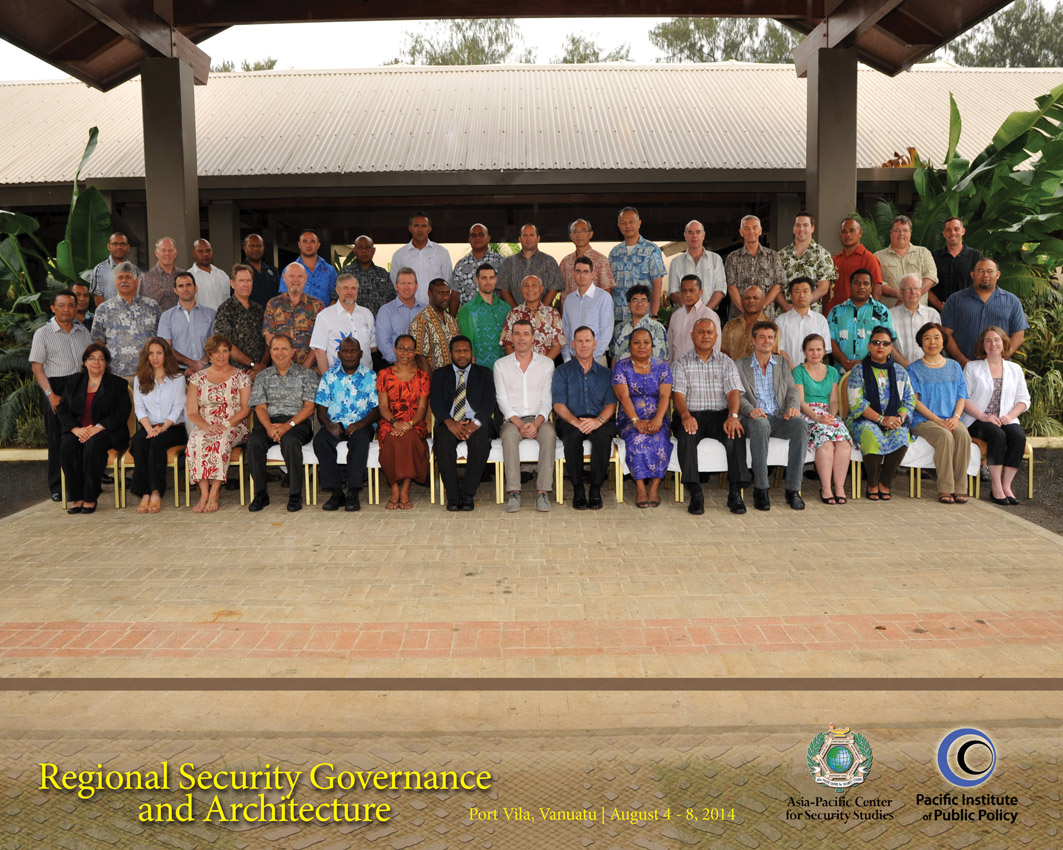
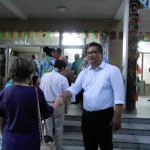
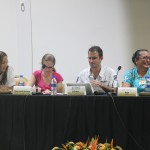
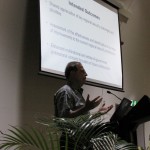
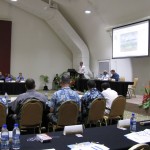
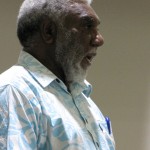
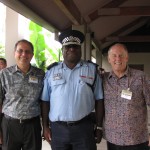
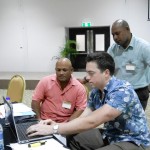
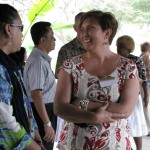
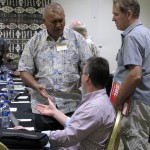
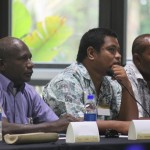



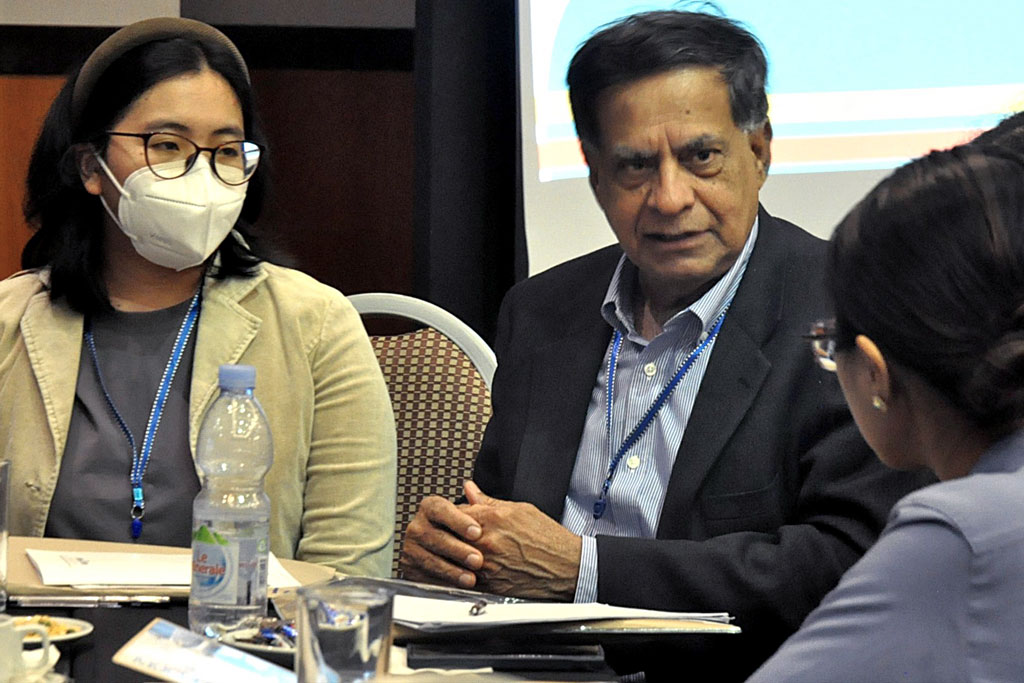




Leave A Comment